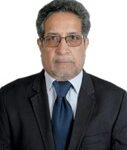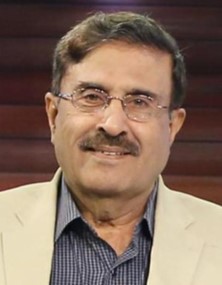
Ukraine War – The Collapse of the World Order
February 23, 2024
Is China Heading Towards War?
February 23, 2024
Ukraine War – The Collapse of the World Order
February 23, 2024
Is China Heading Towards War?
February 23, 2024Brigadier (r) Haris Nawaz
Why are Pakistan’s Fortunes Running in Circles? What Is the Way Forward?
Pakistan is a country that has always played a significant geopolitical role in the region due to its location, size, and historical context. Despite facing numerous challenges, Pakistan needs to take its geopolitical role very seriously, as it is critical to maintain peace and stability in the region. Pakistan, a South Asian country with a population of over 230 million, has had a tumultuous history marked by military coups, political instability, and regional conflicts. The nation's strategic location, bordering India, China, Iran, and Afghanistan, has made it an influential player in the region. However, its entanglement in regional politics has often hampered its potential for economic growth. This Paper will explore whether isolating itself from regional politics and concentrating on building its economic muscles would be beneficial for Pakistan.
Pakistan's geopolitical importance stems from its strategic location, sharing borders with Afghanistan, Iran, China, and India. The country has also been a crucial transit point for trade routes throughout history, connecting Central Asia with South Asia and the Middle East. This unique location provides Pakistan with an opportunity to play a key role in regional politics and diplomacy.
However, Pakistan's economic woes and internal political instability have prevented the country from realizing its full potential in the region. The country has been grappling with economic challenges, such as high inflation, low foreign exchange reserves, and a large trade deficit. These economic woes have hindered Pakistan's ability to make significant contributions to regional development and diplomacy.
Moreover, the country's political instability has been a major obstacle to its geopolitical role. This instability has created a perception of uncertainty and unpredictability in the region, undermining Pakistan's credibility as a reliable partner in regional affairs. Despite these challenges, Pakistan needs to take its geopolitical role seriously, as it has the potential to play a critical role in regional stability and development. To achieve this goal, Pakistan needs to focus on several key areas.
Firstly, Pakistan needs to prioritize economic development and stability. Economic stability is a fundamental prerequisite for Pakistan's ability to play a meaningful role in regional affairs. The government must take measures to stabilize the economy, reduce inflation, increase Foreign Exchange Reserves, and address the Trade Deficit. Economic stability will not only benefit Pakistan's population but also enhance its credibility as a reliable partner in regional affairs.
Secondly, Pakistan needs to address its Internal Political Instability. A stable and predictable political environment is essential for Pakistan to build credibility and trust with its neighbours. The government must take measures to strengthen democratic institutions, ensure political stability, and address the underlying causes of civil unrest. This will help create a conducive environment for Pakistan to engage a regional diplomacy and development.
Thirdly, Pakistan needs to focus on enhancing its diplomatic and strategic engagement with its neighbours and the broader international community. Pakistan has an opportunity to leverage its strategic location to foster regional cooperation and integration. The country must work towards building stronger diplomatic ties with its neighbours, including Russia, China, India, Iran, and Afghanistan. This will not only help create a conducive environment for regional stability but also enhance Pakistan's credibility as a regional leader.
Fourthly, Pakistan needs to prioritize its security concerns, especially in the context of its ongoing conflict with India. The two countries have a history of tensions and conflict, and the situation has further deteriorated in recent years. Pakistan needs to adopt a balanced and pragmatic approach to its security concerns, including the use of diplomacy, dialogue, and conflict resolution mechanisms.
Pakistan needs to invest in human development and social welfare to ensure that its population is equipped to play a meaningful role in regional affairs. Education, healthcare, and social welfare are critical components of a stable and prosperous society, and Pakistan needs to invest in these areas to build a sustainable and vibrant society that can contribute to regional development and stability.
Pakistan is undoubtedly a significant global player; despite the challenges, but its political stability and economic instability undermining its credibility. The country's strategic location, nuclear capability, and role in regional security and stability make it a vital player in the international community. Therefore, Pakistan's foreign and regional policy needs to reflect this position, and the country needs to play an active role in shaping global regional affairs.
One of Pakistan's most critical contributions to the International Community has been its role in the fight against terrorism. The country has been at the forefront of the war on terror, and its cooperation with the International Community in this regard has been significant. Pakistan has suffered greatly from terrorist attacks and has lost thousands of its citizens in the fight against terrorism. The country's efforts in countering terrorism and extremism have been acknowledged and appreciated by the International Community. Our armed forces have eliminated terrorism in most professional way under command COAS and did splendid job, which NATO 51 Countries with latest weapons and equipment.
This unique location of Pakistan gives a critical role in regional diplomacy and conflict resolution. Pakistan has been a mediator in several regional conflicts, such as the US-Taliban peace talks, and has played a constructive role in resolving disputes between Afghanistan and other regional players apart bringing closer USA and China in early 1970s.
Pakistan's nuclear capability also gives it a strategic position in global affairs. The country is one of the nine nuclear-armed states and has a robust nuclear deterrence capability. Pakistan's nuclear capability has been a source of concern for some members of the International Community, but the country has taken fool proof measures to ensure the safety and security of its nuclear arsenal. Pakistan has also been an advocate of nuclear disarmament and non-proliferation and has played a constructive role in global efforts towards these goals. Our command and control system is most modern and duly acknowledged by IAEA and USA.
However, Pakistan's economic troubles and political instability have hindered its ability to play a more prominent role in global affairs. The country's economic challenges, such as high inflation, low Foreign Exchange Reserves, and a large trade deficit, have limited its ability to invest in development projects and contribute to global initiatives. The political instability in the country has also undermined Pakistan's credibility as a reliable partner in regional and global affairs.
Pakistan's foreign and regional policy needs to reflect its position as a global player. The country needs to focus on economic development and stability, invest in human development and social welfare, address political instability, and enhance diplomatic engagement with its neighbours and the International Community. Pakistan needs to prioritize economic development, address political instability, enhance diplomatic engagement, prioritize security concerns, and invest in human development and social welfare. By doing so, Pakistan can play a meaningful role in regional stability and development.
Economic Growth Requires Political Stability
Economic growth and political stability are closely intertwined. Political stability allows for long-term planning and fosters a conducive environment for investment. By isolating itself from regional politics, Pakistan could potentially focus on creating a stable political environment that would be attractive to foreign investors and promote economic growth.
In recent years, the China-Pakistan Economic Corridor (CPEC) has emerged as a crucial platform for economic cooperation between the two countries. It is a flagship project of the larger Belt and Road Initiative (BRI) launched by China, aimed at enhancing regional connectivity and economic integration. If Pakistan were to isolate itself from regional politics, it could potentially harness the full potential of CPEC and other such economic collaborations to boost its economic growth and enhance visible job opportunities for skilled and unskilled Pakistanis.
Redirecting Resources for Economic Development
Pakistan's involvement in regional politics has led to significant financial and human resource allocations to its defence sector. The country has one of the highest military expenditures as a percentage of GDP in the world. By distancing itself from regional politics, Pakistan could redirect these resources towards economic development projects, such as infrastructure, education, and healthcare, which are crucial for sustainable growth.
Investing in education and skill development can help create a more skilled workforce, which is essential for attracting foreign investment and promoting entrepreneurship. Similarly, improved infrastructure can facilitate trade, improve connectivity, and create new job opportunities. By focusing on these areas, Pakistan can build a stronger foundation for economic growth.
Improved International Relations and Trade Opportunities
Pakistan's regional political engagements have sometimes strained its relationships with other countries, particularly India and Afghanistan. By stepping back from these conflicts, Pakistan could improve its relationships with neighbouring countries and beyond, opening up new trade and economic cooperation avenues. We can take example of China, it has only focused on economical development and kept regional and international issues becoming economical viable on the side till economical joint to reclaim its regional disputes like Hong Kong falling peacefully in China's Lap
For instance, improved relations with India could pave the way for increased bilateral trade and cross- border investment. Moreover, as Pakistan improves its international standing, it may be able to negotiate better terms for trade agreements, access international financing, and join regional economic organizations such as the Association of Southeast Asian Nations (ASEAN) and the South Asian Association for Regional Cooperation (SAARC). These opportunities could significantly contribute to Pakistan's economic growth.
Counter-Argument: Regional Politics and National Security One of the primary reasons Pakistan has been deeply involved in regional politics is to safeguard its National Security Interests. Its ongoing rivalry with India and concerns over Afghanistan's stability necessitate a certain degree of involvement in regional politics. Thus, complete isolation from regional politics might not be feasible without compromising its National Security.
However, Pakistan could potentially adopt a more balanced approach, engaging in regional politics only when necessary to protect its interests, while also focusing on its internal development and fostering stronger relationships with other nations. This approach would allow Pakistan to maintain its sovereignty and security while avoiding unnecessary conflicts or dependencies. Here are a few steps that Pakistan can consider to adopt in more balanced approach:
- Strengthening Regional Diplomacy: Pakistan should continue engaging with regional organizations such as SAARC, SCO, and ASEAN to promote dialogue and collaboration on various issues, including trade, connectivity, and security. This will enable Pakistan to foster a stable and cooperative regional environment while protecting its interests.
- Prioritizing Economic Development: Economic growth is crucial for Pakistan's stability and development. By focusing on key sectors such as infrastructure, energy, agriculture, and Information technology, Pakistan can create employment opportunities, reduce poverty, and improve living standards. At the same time, it can enhance its capacity to engage in regional. politics from a position of strength.
- Enhancing Bilateral Relationships: Pakistan should look to strengthen ties with countries. beyond its immediate neighbourhood, such as the European Union, the United States, China, and Russia. These relationships can help Pakistan diversify its economic and political partnerships, and benefit from technology transfers, investments, and market access. Our top most priority should be to have best of relationship with Russia, China and Iran and remain engaged with USA and European Union.
- Addressing Internal Challenges: Pakistan needs to tackle issues like corruption, terrorism, and social inequality to create a more stable domestic environment. By addressing these challenges, Pakistan can increase its credibility on the international stage and develop stronger ties with other nations.
- Promoting a Peaceful Resolution to Conflicts: Pakistan should continue advocating for dialogue and negotiations to resolve disputes with its neighbours, such as the longstanding IIHJK issue with India. A peaceful resolution to these conflicts can create a more stable regional environment and allow Pakistan to focus on its internal development.
- Strengthening its Defence Capabilities: While prioritizing diplomacy and regional cooperation, Pakistan should also work on modernizing and enhancing its defence capabilities to ensure its security and protect its territorial integrity. Our minimum strategical and conventional deterrence is key to national and regional security.
- By adopting a more balanced approach, Pakistan can better manage its regional and international engagements while simultaneously addressing its internal challenges. Despite its economic troubles and political instability, Pakistan remains a global player with a critical role in regional and global affairs. The country's contributions to counterterrorism, Regional Security and Stability, and Nuclear Deterrence are acknowledged and appreciated by the International Community. However, Pakistan's foreign and Regional Policy needs to reflect this position, and the country needs to take steps to address its economic and political challenges to play a more significant role in global/regional affairs. This would ultimately contribute to a more secure, stable, and prosperous future for the country and its people.

The Author
